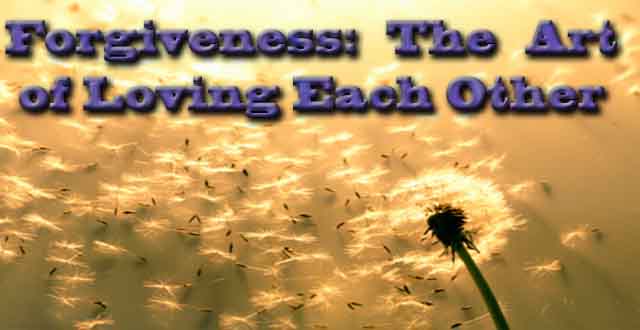
Why Should You Forgive?
1) Forgiving is For You and Your Loved Ones
2) Forgiving is a Choice
This leads us to another important yet often misunderstood aspect of forgiving. Forgiving is a choice. It is not something that happens to us without our consent. Rather, it is a process we elect to actively engage in. This also means that we are free to decide not to forgive. However, as with all other aspects of life, our choices have consequences. One of the consequences of choosing not to forgive is that we may quite literally feel sick from resentment and anger. The upside to this is that we are also free to feel relief and even happiness despite whatever offense has been committed against us because we are able to make the decision to forgive and free ourselves from the negative emotions related to that incident.
3) Forgiving is Not Approval
During the sometimes challenging process of forgiving, we must keep in mind that we are not condoning or consenting to whatever wrong has been committed. Forgiving is not the same thing as accepting or permitting the wrongdoing. Rather, deciding to forgive requires that we first identify the offending action as wrong. Your ability to let go of the pain that action has caused in no way signals your acceptance of that action as appropriate, nor does it reflect your consent to be subjected to such treatment in the future.
4) Forgiveness is Necessary for Healthy Relationships
Related to this issue is the fact that forgiving is an absolute necessity for forming solid, healthy, loving relationships. We are humans, we commit errors. However, not all grievances are committed on purpose. Rather, our actions may have unintended consequences. Moreover, once we have settled our differences, it is necessary to forgive in order to move on to a more positive situation in which old wrongdoings are left in the past. Otherwise, we are condemned to constantly relive the same disagreement over and over.
5) Forgiving Allows Us to Start Over
Finally, the ability to forgive permits us to start anew, to let go of the negative feelings that hold us back and work towards positive goals. The true art of forgiving involves cleansing our minds and our souls of the negative, damaging emotions associated with a past offense. This process permits a newfound sense of relief that can be beneficial to us both mentally and physically. In some cases, emotional pain can manifest itself as acute physical pain. However, studies have shown that forgiving may in fact alleviate that physical pain, literally healing what ails us.
The Next Step: How to Forgive
With so many reasons to consider taking the first step toward forgiving and starting down the road to truly loving ourselves and those around us, the next question is: How do I forgive? Here, we consider five steps essential to the art of forgiving:
1) Express Your Pain
Whether you do so in your diary, to the offending person, or to an impartial third party, it is important to verbalize your pain and pinpoint exactly what caused it.
2) Think Positive
Once you’ve vocalized your pain, it’s important to move on to looking at the positive aspects that have resulted from this offense.
3) Empathize
While it may be difficult to understand why someone you love has hurt you, one of the most important steps on the road to forgiveness is to see things from the other person’s point of view.
4) Love the Other Person
At the heart of forgiving is love. Loving the person that has harmed you is an important way to forgive. Loving others allows us to experience true freedom in the form of unconditional love and understanding, bringing a true sense of fulfillment.
5) Seek Help
There may be some cases where perfecting the art of forgiveness requires professional assistance. If someone you are in a loving relationship with has repeatedly caused you pain, you may need to seek outside assistance in order to move on.
Forgiving offers us a number of benefits. However, it is an ongoing process requiring our active participation. The tips presented here are meant to help you on your way to a healthier, happier, loving relationship with yourself and those around you. The art of truly being able to forgive lies in the realization that we are making the right decision. Permitting ourselves to forgive allows us to release the negative energy that holds us back from reaching our true potential. Forgiving others also allows us to forgive ourselves when we unwittingly commit errors that harm others. One of the most important benefits of forgiving is learning from our mistakes, and those of others, and moving on to a more positive place.